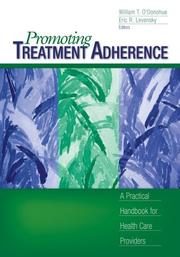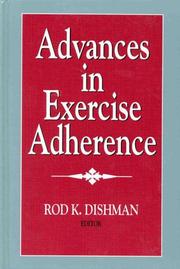| Listing 1 - 10 of 34 | << page >> |
Sort by
|

ISBN: 1317083261 1317083253 1281098221 9786611098223 0754683044 9780754683049 9780566086588 0566086581 9781317083269 9781317083252 9781281098221 6611098224 9781315599694 9781317083245 1315599694 Year: 2006 Publisher: Hampshire, Eng. ; Burlington, VT : Gower,
Abstract | Keywords | Export | Availability | Bookmark
 Loading...
Loading...Choose an application
- Reference Manager
- EndNote
- RefWorks (Direct export to RefWorks)
Vast global resources are ploughed into the delivery of treatment interventions ranging from diet and lifestyle advice through to complex surgery. In all cases, whatever the intervention, unless the recipient is engaged with the process and understands wh
Patient compliance. --- Adherence of patients --- Compliance of patients --- Cooperation of patients --- Patient adherence --- Patient cooperation --- Sick --- Treatment compliance --- Compliance --- Health behavior --- Medical cooperation --- Therapist and patient --- Compliance with regimen --- Cooperation
Periodical
Abstract | Keywords | Export | Availability | Bookmark
 Loading...
Loading...Choose an application
- Reference Manager
- EndNote
- RefWorks (Direct export to RefWorks)
Patient compliance --- Patient compliance. --- Health & Medicine (General) --- Patient Compliance. --- Patient Satisfaction. --- Satisfaction, Patient --- Patient Non-Adherence --- Patient Non-Compliance --- Patient Nonadherence --- Therapeutic Compliance --- Treatment Compliance --- Patient Adherence --- Patient Cooperation --- Patient Noncompliance --- Adherence, Patient --- Compliance, Patient --- Compliance, Therapeutic --- Compliance, Treatment --- Compliances, Therapeutic --- Cooperation, Patient --- Non-Adherence, Patient --- Non-Compliance, Patient --- Nonadherence, Patient --- Noncompliance, Patient --- Patient Non Adherence --- Patient Non Compliance --- Therapeutic Compliances --- Treatment Compliances --- Treatment Refusal --- Directly Observed Therapy --- Adherence of patients --- Compliance of patients --- Cooperation of patients --- Patient adherence --- Patient cooperation --- Sick --- Treatment compliance --- Compliance --- Health behavior --- Medical cooperation --- Therapist and patient --- Compliance with regimen --- Cooperation --- Human medicine --- Health Sciences --- General and Others --- patient satisfaction --- quality of life --- clinical outcomes
Book
ISBN: 9241547839 9786612760815 9240685359 1282760815 Year: 2010 Publisher: Geneva : World Health Organization,
Abstract | Keywords | Export | Availability | Bookmark
 Loading...
Loading...Choose an application
- Reference Manager
- EndNote
- RefWorks (Direct export to RefWorks)
The World Health Organization's Stop TB Department has prepared this fourth edition of Treatment of Tuberculosis: Guidelines, adhering fully to the new WHO process for evidence-based guidelines. Several important recommendations are being promoted in this new edition. First, the recommendation to discontinue the regimen based on just 2 months of rifampicin (2HRZE/6HE) and change to the regimen based on a full 6 months of rifampicin (2HRZE/4HR) will reduce the number of relapses and failures. This will alleviate patient suffering resulting from a second episode of tuberculosis (TB) and conserve
Antitubercular agents. --- Adherence of patients --- Compliance of patients --- Cooperation of patients --- Patient adherence --- Patient cooperation --- Treatment compliance --- Drugs, Antitubercular --- Tuberculostatic agents --- Compliance with regimen --- Tuberculosis --- Patient compliance. --- Sick --- Compliance --- Health behavior --- Medical cooperation --- Therapist and patient --- Antibacterial agents --- Antitubercular agents --- Chemotherapy. --- Cooperation --- Chemotherapy

ISBN: 1281811319 9786611811310 0826122566 9780826122568 9781281811318 0826122558 9780826122551 6611811311 Year: 2004 Publisher: New York, NY Springer Pub.
Abstract | Keywords | Export | Availability | Bookmark
 Loading...
Loading...Choose an application
- Reference Manager
- EndNote
- RefWorks (Direct export to RefWorks)
This book presents a detailed description of a new group method called Planned Group Counseling (PGC). This method was created to cope with the very reluctant behaviors found in chemically dependent and psychiatric patients: lateness, irregular attendance, premature termination, and non-compliance with therapeutic directives. The book provides the readers with a step-by-step guide for implementing PGC, including plans and psychological exercises that are designed to further develop intra-and interpersonal skills. Detailed descriptions of interventions are also included to help the group leader
Mental health counseling --- Drug abuse counseling --- Group counseling --- Mentally ill --- Drug addicts --- Patient compliance. --- Adherence of patients --- Compliance of patients --- Cooperation of patients --- Patient adherence --- Patient cooperation --- Sick --- Treatment compliance --- Compliance --- Health behavior --- Medical cooperation --- Therapist and patient --- Counseling --- Health counseling --- Counseling, Mental health --- Mental health services --- Psychotherapy --- Methodology. --- Rehabilitation. --- Compliance with regimen --- Cooperation

ISBN: 141290532X 1452225974 145226242X 9781452262420 9781452225975 1412944821 9781412944823 1412944821 9781412944823 9781412905329 Year: 2006 Publisher: Thousand Oaks, Calif. Sage Publications
Abstract | Keywords | Export | Availability | Bookmark
 Loading...
Loading...Choose an application
- Reference Manager
- EndNote
- RefWorks (Direct export to RefWorks)
Addresses a central issue in contemporary therapeutic practice adherence to treatment. This volume presents research and theory on adherence, both in general and with respect to individual treatment concerns such as diabetes, HIV, heart care, and more.
Patient compliance. --- Therapeutics. --- Medical treatment --- Therapy --- Treatment of diseases --- Treatments for diseases --- Clinical medicine --- Adherence of patients --- Compliance of patients --- Cooperation of patients --- Patient adherence --- Patient cooperation --- Sick --- Treatment compliance --- Compliance --- Health behavior --- Medical cooperation --- Therapist and patient --- Compliance with regimen --- Cooperation --- Patient compliance --- Therapietrouw
Book
ISBN: 9783030931469 Year: 2022 Publisher: Cham Springer International Publishing :Imprint: Springer
Abstract | Keywords | Export | Availability | Bookmark
 Loading...
Loading...Choose an application
- Reference Manager
- EndNote
- RefWorks (Direct export to RefWorks)
Patient compliance. --- Artificial respiration --- Artificial ventilation (Therapy) --- Mechanical ventilation (Therapy) --- Pulmonary resuscitation --- Rescue breathing --- Respiration, Artificial --- Ventilation, Mechanical (Therapy) --- First aid in illness and injury --- Respiratory therapy --- Resuscitation --- Adherence of patients --- Compliance of patients --- Cooperation of patients --- Patient adherence --- Patient cooperation --- Sick --- Treatment compliance --- Compliance --- Health behavior --- Medical cooperation --- Therapist and patient --- Compliance with regimen --- Cooperation
Book
ISBN: 9783319122649 9783319122656 3319122649 3319122657 Year: 2015 Volume: 118 Publisher: Cham : Springer International Publishing : Imprint: Springer,
Abstract | Keywords | Export | Availability | Bookmark
 Loading...
Loading...Choose an application
- Reference Manager
- EndNote
- RefWorks (Direct export to RefWorks)
The goal of this book is to describe the mechanisms of patients’ adherence to long-term therapies, whose improvement, according to the World Health Organization (WHO), would be more beneficial than any biomedical progress. For example, approximately half of the patients do not regularly follow medical prescriptions, resulting in deleterious effects on people’s health and a strong impact on health expenditure. This book describes how our beliefs, desires, and emotions intervene in our choices concerning our health, by referring to concepts developed within the framework of the philosophy of mind. In particular, it tries to explain how we can choose between an immediate pleasure and a remote reward—preserving our health and our life. We postulate that such an “intertemporal” choice can be directed by a “principle of foresight” which leads us to give priority to the future. Just like patients’ non-adherence to prescribed medications, doctors often don’t always do what they should: They are non-adherent to good practice guidelines. We propose that what was recently described as “clinical inertia” could also represent a case of myopia: From time to time doctors fail to consider the long-term interests of their patient. Both patients’ non-adherence and doctors’ clinical inertia represent major barriers to the efficiency of care. However, it is also necessary to respect patients’ autonomy. The analysis of relationship between mind and care which is provided in this book sheds new light on the nature of the therapeutic alliance between doctor and patient, solving the dilemma between the ethical principles of beneficence and autonomy.
Philosophy. --- Philosophy of Medicine. --- Theory of Medicine/Bioethics. --- Philosophy (General). --- medicine --- Medical ethics. --- Ethique médicale --- medicine_xPhilosophy. --- Medicine --- Health & Biological Sciences --- Medical Ethics & Philosophy --- Patient compliance. --- Adherence of patients --- Compliance of patients --- Cooperation of patients --- Patient adherence --- Patient cooperation --- Sick --- Treatment compliance --- Compliance with regimen --- Cooperation --- Compliance --- Health behavior --- Medical cooperation --- Therapist and patient --- Medicine-Philosophy. --- Biomedical ethics --- Clinical ethics --- Ethics, Medical --- Health care ethics --- Medical care --- Bioethics --- Professional ethics --- Nursing ethics --- Social medicine --- Moral and ethical aspects --- Medicine—Philosophy.

ISBN: 087322664X Year: 1994 Publisher: Champaign, IL : ©1994 Human Kinetics,
Abstract | Keywords | Export | Availability | Bookmark
 Loading...
Loading...Choose an application
- Reference Manager
- EndNote
- RefWorks (Direct export to RefWorks)
L'ouvrage prolonge celui édité par le même auteur "Exercise Adherence. Its impact on public health". Près de 30 spécialistes font le point sur les moyens de promouvoir la pratique régulière de l'activité physique. Ils s'adressent aux spécialistes de l'éducation physique, aux médecins et aux psychologues actifs dans le secteur de la psychologie de la santé. La 1ère partie est centrée sur les effets du sport sur la santé physique et mentale. La 2de partie présente des études sur les facteurs favorisant la régularité de la pratique sportive. La 3ème partie fournit des stratégies concrètes incitant à l'exercice physique régulier. La dernière partie présente des questions spéciales telles que la mise en forme physique chez les adolescents, chez les personnes du troisième âge et notamment l'utilisation de l'activité physique dans les programmes d'amaigrissement
Exercise. --- Health behavior. --- Patient compliance. --- 614 --- Exercise --- Health behavior --- Patient compliance --- Adherence of patients --- Compliance of patients --- Cooperation of patients --- Patient adherence --- Patient cooperation --- Sick --- Treatment compliance --- Compliance --- Medical cooperation --- Therapist and patient --- Behavior, Health --- Health habits --- Diseases --- Habit --- Health attitudes --- Human behavior --- Medicine and psychology --- Physical activity --- Warm-up --- Workouts (Exercise) --- Health --- Physical education and training --- Openbare gezondheidszorg--(zie ook {351.84}) --- Compliance with regimen --- Cooperation --- Causes and theories of causation --- Medische psychologie --- gezondheidspsychologie --- gezondheidspsychologie.
Book
ISBN: 3319309927 3319309943 Year: 2016 Publisher: Cham : Springer International Publishing : Imprint: Adis,
Abstract | Keywords | Export | Availability | Bookmark
 Loading...
Loading...Choose an application
- Reference Manager
- EndNote
- RefWorks (Direct export to RefWorks)
An essential, comprehensive, and practical guide to understanding, measuring, and modifying patients’ adherence behavior to optimize treatment outcomes, this book covers all major aspects of adherence in dermatology. The first section describes current knowledge on the magnitude and impact of nonadherence; the second outlines measuring adherence in the context of databases, trials and practice. The third section addresses adherence in key skin diseases and the fourth covers numerous strategies to improve adherence by mitigating specific patient barriers. All sections emphasize ways to optimize communication with patients: the foundation for producing successful health behavior change. Low adherence helps explain why, despite effective treatments existing for all major dermatologic conditions, many patients still fail to improve. When clinicians endeavour to maximize adherence, with the aid of evidence-based strategies, these drugs will often realise their potential. This book devotes special attention to understanding why individuals may be nonadherent, so that each patient can receive a suitable treatment regimen, with a personalized plan of action. This book is designed for clinicians at all levels, serving as both introductory training for medical students and residents, and an update on the field for experienced practitioners. Researchers and policymakers will also benefit from its coverage of research methods and the impact of nonadherence in specific diseases. Adherence in Dermatology bridges the gap between outcomes researchers and clinicians by explaining the latest findings in plain language, with examples from everyday dermatologic practice.
Medicine. --- Dermatology. --- General practice (Medicine). --- Medicine & Public Health. --- Medicine/Public Health, general. --- General Practice / Family Medicine. --- Skin --- Patient compliance. --- Diseases --- Treatment. --- Adherence of patients --- Compliance of patients --- Cooperation of patients --- Patient adherence --- Patient cooperation --- Sick --- Treatment compliance --- Compliance with regimen --- Cooperation --- Compliance --- Health behavior --- Medical cooperation --- Therapist and patient --- Family medicine. --- Family practice (Medicine) --- General practice (Medicine) --- Medicine --- Physicians (General practice) --- Clinical sciences --- Medical profession --- Human biology --- Life sciences --- Medical sciences --- Pathology --- Physicians --- Health Workforce
Book
ISBN: 025335725X Year: 1987 Publisher: Bloomington Indiana university press
Abstract | Keywords | Export | Availability | Bookmark
 Loading...
Loading...Choose an application
- Reference Manager
- EndNote
- RefWorks (Direct export to RefWorks)
Human experimentation in medicine --- -Medical ethics --- Patient compliance --- #GBIB:CBMER --- Adherence of patients --- Compliance of patients --- Cooperation of patients --- Patient adherence --- Patient cooperation --- Sick --- Treatment compliance --- Compliance --- Health behavior --- Medical cooperation --- Therapist and patient --- Biomedical ethics --- Clinical ethics --- Ethics, Medical --- Health care ethics --- Medical care --- Medicine --- Bioethics --- Professional ethics --- Nursing ethics --- Social medicine --- Experimentation on humans, Medical --- Medical experimentation on humans --- Medical ethics --- Medicine, Experimental --- Clinical trials --- Moral and ethical aspects --- Compliance with regimen --- Cooperation --- Research
| Listing 1 - 10 of 34 | << page >> |
Sort by
|

 Search
Search Feedback
Feedback About UniCat
About UniCat  Help
Help News
News